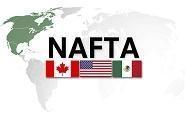Product

March 5, 2018
Trump Uses Section 232 as Leverage in NAFTA Talks
Written by Sandy Williams
Trump says there will be no tariff exclusions for Canada and Mexico unless a “new and fair NAFTA agreement is signed.” Translation: If you accede to our demands, we will exclude you from Section 232.
Trump tweeted early on Monday morning: “We have large trade deficits with Mexico and Canada. NAFTA, which is under renegotiation right now, has been a bad deal for U.S.A. Massive relocation of companies & jobs. Tariffs on Steel and Aluminum will only come off if new & fair NAFTA agreement is signed. Also, Canada must treat our farmers much better. Highly restrictive. Mexico must do much more on stopping drugs from pouring into the U.S. They have not done what needs to be done. Millions of people addicted and dying.”
Whether the threat will work to persuade Canada and Mexico to capitulate to U.S. demands is yet to be seen. The two nations have rebuked the U.S. for insisting on changes on rules of origin, procurement, and dispute settlement that clearly favor the United States rather than facilitating fair trade between the three trading partners. They are also expected to join with other nations in opposing the Section 232 tariffs at the World Trade Organization. So far, the Trump administration appears unimpressed and unworried.
Ildefonso Guarjardo, Mexico’s Secretary of Economy, tweeted back at Trump,“Mexico shouldn’t be included in steel & aluminum tariffs. It’s the wrong way to incentivize the creation of a new and modern NAFTA.”
{loadposition reserved_message}
A breakdown in procurement talks at NAFTA has prompted bilateral negotiations between Mexico and Canada. The U.S. has proposed a “dollar-for-dollar” approach that would combine Canadian and Mexican procurement against that of the U.S, a proposal that critics say is ludicrous because of the much larger size of the American market.
Canada and Mexico rebuffed the idea calling it a “non-starter.” Canada chief negotiator Steve Verheul said it was the “worst proposal that’s ever been made in history.”
Mexico put forward its own tongue-in-cheek proposal at the fifth round, suggesting a “peso-for dollar” requirement to illustrate the unfairness of the U.S. proposal.
Negotiators have made progress on some of the less contentious issues for the new agreement, closing five of the 30 topic areas.
“NAFTA negotiations are at a critical point where there are specific and very technical issues that are going to be elevated to a higher decision-making level, out of the negotiating table,” said attorney Carlos Vejar, a former negotiator for the Mexican Ministry of Economy, to Bloomberg. “Some of those issues will not be resolved until the very end of the negotiations, at the very last moment. Either you get the deal done, or you just can’t.”
As negotiators wrap up the seventh round of discussions on Monday, the Section 232 tariffs are expected to dominate the conversation.







